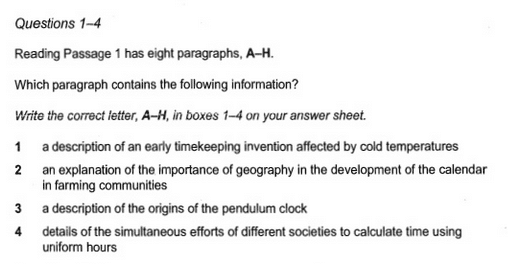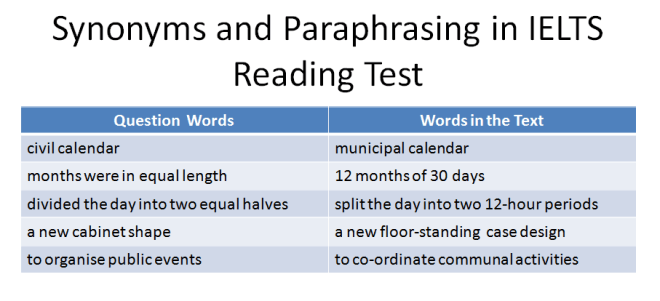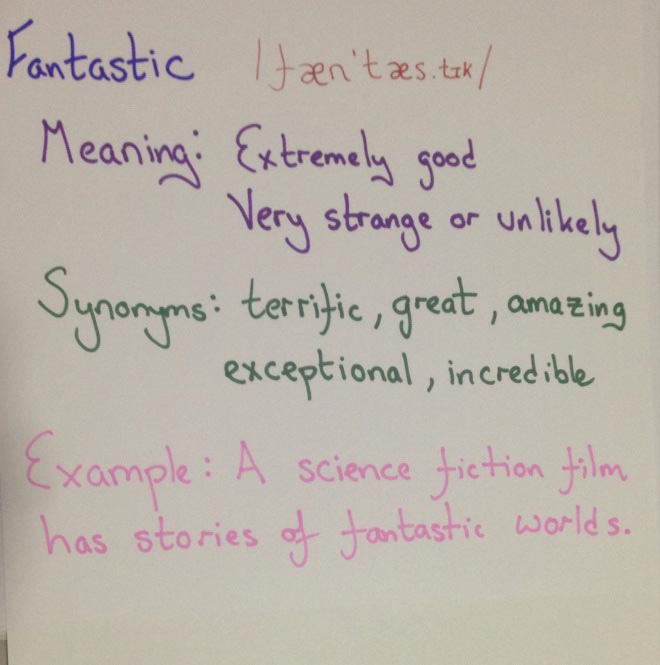Let me tell you a secret. The IELTS reading test is not really a reading test. Sure you need to use reading skills like skimming and scanning but, lots of people have done really well on the IELTS test without practicing these skills.
What separates students who get band 9 and everyone else is one thing. Vocabulary. The reading test is not really a test of your reading skills it is a VOCABULARY test!
You not only have to know lots of vocabulary but you have to know lots of synonyms (words that have the same or very similar meanings).
Don’t believe me? Let’s look at some past exam papers.
Source: Cambridge English IELTS Past Papers.
This question looks simple enough. All we have to do is use our reading skills to locate the information in the paragraphs, right? Not really!
The answer to number one is in the paragraph below:
So you would have to know that ‘affected by cold temperatures’ had been paraphrased as ‘could not always be depended on in…freezing weather’.
Let’s look at the answer to number 2:
To answer this question correctly we would have to know that ‘farming communities’ means the same thing as ‘where seasonal agriculture was practiced’.
In the same paper there were several more examples of synonyms and paraphrasing:
Why are there so many synonyms?
To answer this we have to understand how the IELTS reading test is made. The people at IELTS find a piece of writing. They then take that writing and make questions. If they simply copied the words and phrases it would be too easy, so they use synonyms to paraphrase. The result is lots of questions that have the same meaning as parts of the text but written in a different way.
When you understand this and start to look for these synonyms the IELTS reading test becomes much easier.
Should I practice lots of tests and find all the synonyms?
It is always a good idea to practice for the IELTS reading test, however, there are just far too many synonyms in the English language and it is extremely unlikely that the same ones will come up again.
So how do I improve my vocabulary?
Students ask me this all the time and I always tell them that reading is the single most effective way to improve your vocabulary. However, there are two very important things you should keep in mind.
First, don’t read IELTS past papers. As I said above, it is important to practice these, but not all the time. It is much better if you read about something you are interested in. If you do this, you are more likely to learn something and not get bored. If you love football, read a football magazine. If you love clothes, read a fashion blog. Interested in world affairs? Read the international news.
Secondly, you must record and review new words. When you see a new word, underline it. At the end, you can go back and try to guess the meaning. You will have to do this in the reading test, so it’s a good skill to practice. You can then confirm the meaning in a dictionary or online.
You must then write these words down in a special notebook. Beside each word write the meaning, synonyms, and example sentences. Here is an example;
By keeping a book you can then go back and review new words every week or so.
If you do this every day you will have increased your vocabulary significantly.
Below are some websites with interesting articles depending on your interests:
NATIONAL GEOGRAPHIC
NEW SCIENTIST
THE ECONOMIST
HISTORY TODAY
TIME
COSMOPOLITAN
WIRED
How can I practice the tests?
I advise my students to do the IELTS reading tests ‘fast’ and ‘slow’. By this I mean, do it once under exam conditions and then do it again with a dictionary and take as much time as you like.
By doing it fast you practice time management which is one of the most important things on the test.
After you have finished you should do it slowly, paying particular attention to any questions you got wrong. Find out why you got it wrong and use the dictionary to help you identify any synonyms.
If you do this enough times, you will see a pattern emerge and you will start to see synonyms automatically. You will also quickly learn from your mistakes.
Click on the link to access lots of practice tests from IELTS.ORG.





